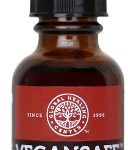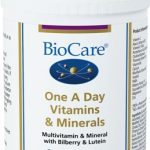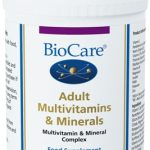A sure sign something’s wrong with your metabolism (the natural chemical reactions that happen within the body) is if you start to feel unexpectedly lethargic or too easily exhausted – in short, if your energy levels inexplicably drop. There could be many reasons for why this happens, of course, but one is because your thyroid gland isn’t working properly.
To be specific, this is what’s known as hypothyroidism – in layman’s terms, a sluggish, underactive thyroid; when this particular gland isn’t doing its fundamental job, producing enough hormones for the body. And, you may not be surprised to learn, there’s often a link between hypothyroidism and the body getting too little (or, at least, absorbing too little) of one of those all-important nutrients, a vitamin – in this case, Vitamin B12. So much so, in fact, that a vicious circle can develop – hypothyroidism can cause a deficiency in Vitamin B12 which, in turn, can drive hypothyroidism and negatively affect energy1.
What does the thyroid gland do?
Butterfly-shaped, though it may be, there’s little that’s cute and romantic about the thyroid if something goes wrong. That’s because this small gland located at the front of the neck is an utterly critical component of the hormone-producing endocrine system. It creates and distributes the crucially important thyroid hormones T3 and T4 (which regulate metabolism and heartbeat)2 and produces other thyroid hormones to drive up energy levels, as and when needed, therefore determining the necessary – and correct – number of calories your body burns while at rest3.
Why is B12 so important to the body?
As for B12; for its part, it could be said to be just as crucial to the good functioning of the body and your wellbeing. It plays a major role in the creation of red blood cells, conversion of proteins, synthesis of DNA and fatty acids4 and in nerve health5 and neurological function6. It’s also important for bone strength and, it’s believed, for both mental health and the brain’s physical health.
Even irrespective of hypothyroidism then, Vitamin B12 deficiency is bad news. And certain groups of the population, it appears, are more at risk of it than others – among them ageing adults (thanks to lower hydrochloric acid levels in the stomach)5 and sufferers of Crohn’s disease, celiac disease7, inflammatory bowel disease (IBD) and alcoholism8. Symptoms in the B12-deficient often include constipation, depression, fatigue, reduced appetite and/ or memory, tingling at the end of limbs and tongue soreness5.
Boosting your B12 intake
As you’d assume, it’s most natural to get one’s B12 fill via diet – but that’s, of course, dependent on maintaining the right diet. Dairy, eggs and seafood are all good sources for the vitamin, while (specifically for vegetarians) cereals and some nutritional yeast are also B12-rich. That said, an authority no less than the United States Department of Agriculture has actually recommended that those deficient in B12 might want to turn to supplementation to boost their intake, as it tends to be more easily and readily absorbed via this method than through food sources9.
Moreover, while its findings pointed to around 40% of hyperthyroid patients also having B12 deficiency (a high commonality), a recent study discovered that, by giving them B12 supplements, their weakness, memory, mood and other symptoms improved10. To that end, natural supplementation may well prove the way to go to boost you B12 levels and help potential – or pre-existing – hypothyroidism. Indeed, the following Vitamin B12 supplements, among many others, are available through us at The Finchley Clinic:
Vegansafe B12 – a vegan-friendly formula containing methylcobalamin and adenosylcobalmin, two highly bioactive forms of B-12, providing support for energy levels, metabolism and natural sleep, as well as helping to address B12 deficiency.
One-A-Day Multivitamin & Minerals – a high-strength, multi-nutrient tablet in readily absorbable forms; great as a maintenance supplement to cover any B12 shortfalls (and those of other vitamins and nutrients).
Adult Multivitamins & Minerals – a one-a-day capsule for adults, providing good all round nutritional support; also contains bioavailable minerals for enhanced absorption.
References:
1. Kibirige D. and Mwebaze R. ‘Vitamin B-12 Deficiency Among Patients with Diabetes Mellitus: Is Routine Screening and Supplementation Justified?’. J Diabetes Metab Disord. May 2013. 12: 17.
2. ‘Thyroid diseases’. MedlinePlus.gov. US National Library of Medicine. Aug 2016.
3. ‘How does the thyroid work?’. https://www.ncbi.nlm.nih.gov/pubmedhealth/PMH0072572/. PubMed Health. US National Library of Medicine. Last updated: Jan 2015.
4. ‘B-12’. https://www.nrv.gov.au/nutrients/vitamin-B-12. Australian Government National Health and Medical Research Council. Jan 2005.
5. ‘Office of dietary supplements – Vitamin B-12’. National Institutes of Health. US Department of Health & Human Services. June 2011.
6. ‘Office of dietary supplements – Dietary supplement fact sheet: Vitamin B-12’. National Institutes of Health. US Department of Health & Human Services. Feb 2016.
7. ‘Hypothyroidism (Underactive Thyroid)’. https://www.niddk.nih.gov/health-information/endocrine-diseases/hypothyroidism. National Institute of Diabetes, Digestive and Kidney Disorders. US Department of Health & Human Services. Aug 2016.
8. ‘Nutrition and IBD’. http://www.crohnscolitisfoundation.org/resources/nutrition-and-ibd.html. Crohn’s & Colitis Foundation of America. 2016.
9. ‘Questions To Ask Before Taking Vitamin and Mineral Supplements’. https://www.nutrition.gov/dietary-supplements/questions-ask-taking-vitamin-and-mineral-supplements. Nutrition.gov. Aug 2016.
10. Jabbar A. et al. ‘Vitamin B-12 Deficiency Common in Primary Hypothyroidism’. J Pak Med Assoc. May 2008. 58 (5): 258-61.



